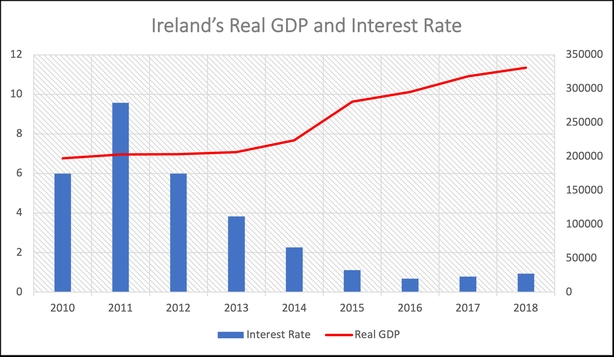Analysis: the ECB hope their series of ongoing interest rate hikes will reduce inflation and help with the cost of living crisis
The European Central Bank (ECB) have raised interest rates by another 0.25%. For anyone wondering who the ECB are, they're basically the bank for banks. Currently they want to increase interest rates because they are desperate to reduce inflation. From an economics perspective, this can be considered smart practice because prices increasing while countries face a cost of living crisis would be a serious issue for citizens.
We need your consent to load this rte-player contentWe use rte-player to manage extra content that can set cookies on your device and collect data about your activity. Please review their details and accept them to load the content.Manage Preferences
From RTÉ Radio 1's News At One, RTÉ Economics Correspondent Robert Shortt and Irish Mortgage Holders Association's David Hall discuss the latest rate rise
So how does increasing the interest rate impact inflation? The great monetary economist, Milton Friedman, said that inflation was 'always and everywhere a monetary phenomenon'. This means that prices go up if the monetary supply increases. More specifically, it means prices go up if the monetary supply increases relative to production.
Here's an example. Suppose you and two other people are the only consumers in the economy. There is one supplier of bread, and you are the only consumer who has money. The supplier of the bread must set their price at whatever you're willing to spend or she can’t make any money.
But let’s say that there is an increase in the monetary supply and now all the consumers in the economy have money. Suddenly, the baker can sell her bread to the highest bidder, prices go up, and that’s inflation. Alternatively, if there was an increase in production and a second baker entered the economy, they would have to compete on price and as a result, the price should go down – deflation.
We need your consent to load this rte-player contentWe use rte-player to manage extra content that can set cookies on your device and collect data about your activity. Please review their details and accept them to load the content.Manage Preferences
From RTÉ Radio 1's Late Debate, how inflation is still hitting Irish consumers hard in their pockets
Inflation is when there is more money available in the economy than there is goods and services being produced. Economists represent this with the following equation, i= ∆M2 - ∆RGDP, which just means that inflation will increase if the money supply (M2) ever exceeds real GDP growth (∆RGDP). This equation explains why the ECB want to increase interest rates in order to reduce inflation.
The interest rate is essentially just the price of borrowing money. If interest rates are very low, then repayments on loans and the interest people make on their savings is also very low. Therefore, low interest rates incentivise people to borrow and spend money instead of saving it.
This increases what economists call velocity which refers to the rate at which money travels through the economy via transactions. Increases in velocity (spending money) increase the monetary supply within the economy. If you spend €10 in a coffee shop and then the coffee shop spends half of that on ordering more coffee beans, the value of your initial €10 to the economy is now already €15. If the same money is used in different transactions, it multiplies out in total value. More transactions within the economy will increase the money supply, which will in turn increase inflation.

Manipulating the interest rate in order to influence economic activity is well supported empirically as you can see from the graph above. Reducing the interest rate reduces the cost of borrowing money and, as a result, increases investment and consumption within the economy which results in greater economic growth. This is what Keynesian economists refer to as stimulating aggregate demand.
But the ECB are trying to cool down aggregate demand. They want to reduce inflation so they are increasing interest rates. This makes it more expensive to borrow money and more lucrative to save it. Thus, incentivising saving over consuming and investing. This reduces the number of transactions in the economy which decreases the money supply and should result in less inflation.
READ: 3 reasons why Irish households have billions in savings right now
This can all be summed up well using the analogy of the doctor getting the patient to take their medicine. The ECB is the doctor and inflation is the patient. Unfortunately for you and I, our reduced spending is the medicine. Increasing interest rates will reduce inflation and make things less expensive for us, but we will have to suffer through the likely recession in between.
The views expressed here are those of the author and do not represent or reflect the views of RTÉ








